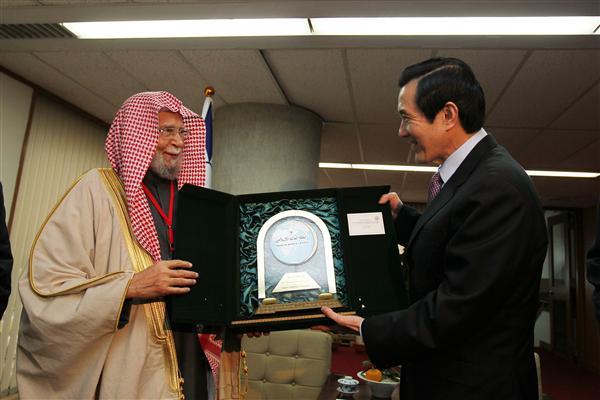News & activities
 News releases
News releases
President Ma Ying-jeou on the morning of February 21 attended the opening ceremonies of a seminar on the theme of "Dialogue: A Human Common Bond," held by the Muslim World League. The president reiterated the government's respect for religious diversity and expressed his hopes that, by discussing common human values, this seminar will help promote greater interaction between various sectors in Taiwan and the Islamic world, thus enabling society to become more harmonious and the world more peaceful.
In remarks to the gathering, the president first welcomed the over 20 religious leaders and scholars from 14 nations to Taiwan. He remarked that Islam is one of the world's most important religions and that it abides by the tenets of "monotheism, charity wards off evil, be kind to all people and animals, and to love all things." This philosophy displays the demands that Islam places on the individual as well as concern for the world, he said. At present, the president said, there are more than 1.3 billion Muslims in the world, who account for one-quarter of the world's population. Taiwan has about 200,000 Muslims, with 50,000 being ROC nationals and the remainder largely being Indonesians working here. While the overall number of Muslims here is not large, the community is quite devout, he said.
President Ma commented that humanism and morals are the common starting points for most of the hundreds and thousands of religions around the world. Taking Islam for example, he said, the literal meaning of this word is peace and submission. This shares many similarities with Confucian thought, which stresses kindheartedness and the world as a commonwealth state. The reverence that Muslims have for Allah also resembles the "respect for heaven" among Confucianists, he said. These highlight that different religions do share common values, the president remarked.
President Ma furthermore said that Taiwan respects religious diversity and the implementation of freedom and democracy, which has paved the way for the robust development of religion here. The people also have freedom to preach religion and to be religious as they choose. While most of Taiwan's religions originated in mainland China, in recent decades Taiwan has developed a unique religious culture with Taiwan characteristics that stresses secularism, religions being run professionally, volunteerism, and internationalization, he said. Meanwhile, Taiwan's religious groups, he remarked, not only enthusiastically hold charitable activities, but also are active in disaster relief work. This, the president said, has enabled many people here to recognize and have an awareness for the important role played by religion.
The president stressed that the government is currently working to enable the nation to be a peacemaker, a provider of humanitarian aid, a promoter of cultural ties, a creator of new technology and business opportunities, and a standard-bearer of Chinese culture. He said he hopes this conference will help to extend tradition, strengthen mutual exchanges, and foster world peace.



